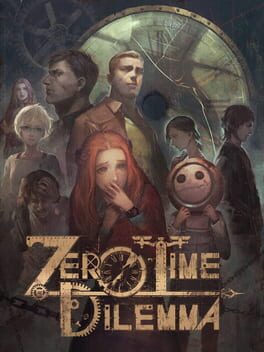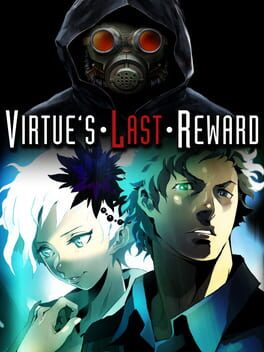

Zero Escape: Nine Hours, Nine Persons, Nine Doors
The first game in the Zero Escape series, originally made as a standalone title "Nine Hours, Nine Persons, Nine Doors". The Zero Escape rebranding and alternative cover of the game were released around the time of the Sequel "Zero Escape: Virtue's Last Reward". The game is a murder mystery visual novel with a heavy story focus that requires multiple playthroughs to figure out and involves puzzle rooms used to progress through the story with dialogue choices to be made inbetween them. The iOS version of the game removed the puzzle rooms to focus more on the visual novel aspects of the game. The puzzle rooms are replaced with narration of the events that take place instead. The iOS version of the game also has an exclusive ending.
Also in series
Released on
Genres
Reviews View More
It’s also an escape game… game. You are locked in places and you’ve got to figure out where to go. The game alternates between these escape puzzles and story sections where the party will progress inside the boat, looking for an exit.
The atmosphere is spot-on
You are locked inside a big boat and it’s gonna sink. The environments are modelized in very basic 3D but this works in the game’s favour because the poor 3D models make everything feel cold, alien and eerie. Similarly, the sound design is really nice. The sounds of the interface also have that eerie feel and the soundtrack manages to convey tension throughout the game.
The story perfectly captivates the vibe of being locked inside a mysterious location which you get to know through your progress in the game and your multiple runs, revisiting locations as the game centres around a few spots. It will introduce future locations early on too so you can get used to it: see that door? It’s locked, but now you know there’s a mysterious door with a mysterious symbol on it.
The puzzles are satisfying but not exceptional
999 is a hybrid between two genres and I don’t think it excels at puzzles. However, they are decent and provide a good amount of fun. I think that a lot of the puzzles are too linear and the solution comes up way too naturally: you usually can only do one thing at the beginning and you’ll easily know what to do next, until the end of the puzzle. For example, you do not get to pick up a lot of items that you’ll use later, especially because of the game’s nature where every puzzle is isolated instead of being a whole
You don’t get to visit the ship yourself but through the story, this is a pretty heavy limit and I think it does not play in the game’s favour as I would actually have loved having the freedom to do so. Linearity aside, it’s just too easy to guess what to do and the characters also give a lot of hints. Honestly, I think most hints sounded silly because the puzzles are simple enough yet you have to read all these talks where the characters are trying to figure out the solution but where at the same time the writing is trying to hide the actual answer.
A story too constrained into a single ending:
A lot of visual novels have multiple paths you can take yet ultimately a single “true” one. 999 is no exception and it comes with the flaws of the genre. The alternative possibilities in this story do not offer much and the main use is to have the player experience multiple attempts at solving the story. This ends up quite repetitive because the information you acquire through the alternative routes is eventually used in the true ending and thus had to be explained again, in a clumsy and redundant manner mostly (although there is a neat gimmick about it too).
Another problem 999 has is that it somewhat lacks a story for a good portion of the game. Because of the way the plot is designed, there aren’t many secrets to be revealed or progress to be made that wouldn’t give away the entire plot. Thus, the plot is heavily concentrated into the true ending of the game. This route is actually quite long and took me about a third of my entire playtime of the game, compared to other ending branches which would be maybe 30 minutes long.
Because the story is so concentrated, the feeling of progress is lessened and the incentives to move forward are limited. There are only little details that matter in most routes and nothing big to retain from them. You do one route, reach a dead end with no explanation of why you failed and you just got to try another path. Thankfully, the PC port has a flowchart allowing you to go back to any point in the story instead of restarting everything, this makes it very convenient to play through the entire content and I am not convinced at all by those who criticise this system.
The reason why I believe the flowchart is essential is that there’s no impact to the choices you make and your progress is up to luck. Almost all of your choices are about which door to go through and you wouldn’t know what happen ahead of time. The other choices are choices that appear pretty inconsequential yet they are required to reach two of the endings. I thought they were really bad. At one point, a character asks a maths question and I had to answer wrong to unlock a certain path: there’s no way I would guess it without indications.
That aside, I did actually enjoy the story and I think they were some very touching moments.
Pseudoscience and fun facts, I say no:
One last thing I strongly dislike about this game is how pedantic it can get. To explain this, I will try to make up a situation that didn’t happen in the game but in a way that would happen in the game:
The group finds a nuclear bomb with a timer counting down. They panic but one character manages to keep their calm and starts explaining, “this is a nuclear bomb, do you know how nuclear science has allowed us to make a nuclear bomb? It was discovered by…”. After a lengthy explanation of how nuclear bombs work, another character will reveal their expertise in this science and start adding some precisions, “hey, this is actually a 1 megaton bomb, the radius of explosion would be around 10 km. If this exploded, we’re all dead!”. After this, we finally get to see the characters do something and how it’s gonna matter in the plot.
Quite a lot of the time, the story is interrupted by this kind of needless jargon you would hear from a high schooler trying to tell you cool science facts, if not pseudoscience. Yeah, the game also has a lot of pseudoscience and because of the way it was introduced I really wasn’t convinced. Not only is the introduction improper but the fact that all of the characters turn into some weirdos with random fun fact encyclopaedias in their head is just absurd to me.
Overall I did enjoy the game and appreciated it. It’s not the VN nor puzzle game I liked the most but I still think it has its merits.


